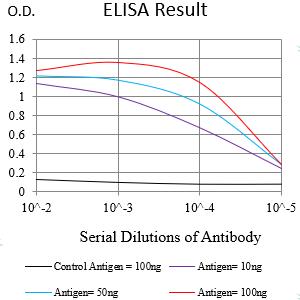
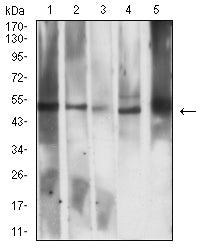
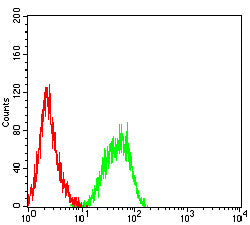
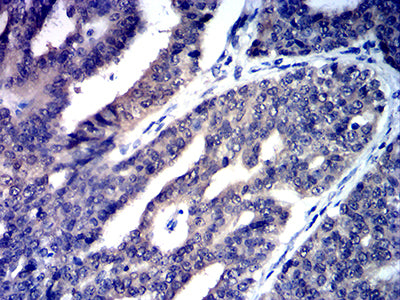
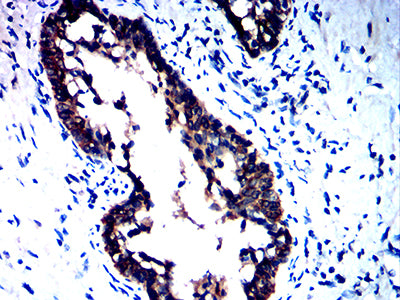
| WB | 1/500 - 1/2000 | Human,Mouse,Rat |
| IF | 咨询技术 | Human,Mouse,Rat |
| IHC | 1/200 - 1/1000 | Human,Mouse,Rat |
| ICC | 技术咨询 | Human,Mouse,Rat |
| FCM | 1/200 - 1/400 | Human,Mouse,Rat |
| Elisa | 1/10000 | Human,Mouse,Rat |
| Aliases | TNFSF14; LTg; HVEML; LIGHT |
| Entrez GeneID | 8740 |
| clone | 1D5D10 |
| WB Predicted band size | 26.4kDa |
| Host/Isotype | Mouse IgG2b |
| Antibody Type | Primary antibody |
| Storage | Store at 4°C short term. Aliquot and store at -20°C long term. Avoid freeze/thaw cycles. |
| Species Reactivity | Human, Mouse |
| Immunogen | Purified recombinant fragment of human CD258 (AA: extra 59-240) expressed in E. Coli. |
| Formulation | Purified antibody in PBS with 0.05% sodium azide |
+ +
以下是关于CD258(LIGHT/TNFSF14)抗体的3篇参考文献示例,包含文献名称、作者及摘要内容概括:
---
1. **文献名称**:*Targeting LIGHT (CD258) in autoimmune diseases: Preclinical evidence and clinical potential*
**作者**:Ware CF, et al.
**摘要**:该研究探讨了抗CD258单克隆抗体在自身免疫疾病模型(如类风湿性关节炎和系统性红斑狼疮)中的应用。抗体通过阻断LIGHT与受体HVEM/LTβR的相互作用,抑制T细胞过度活化和炎症因子释放,显著减轻疾病症状。
---
2. **文献名称**:*Anti-LIGHT monoclonal antibody therapy suppresses colorectal tumor growth via enhancing antitumor immunity*
**作者**:Tamada K, et al.
**摘要**:研究利用抗CD258抗体靶向肿瘤微环境中的LIGHT信号通路。实验显示,抗体通过增强CD8+ T细胞浸润并抑制调节性T细胞(Treg)功能,抑制结直肠癌小鼠模型的肿瘤生长,提示其作为癌症免疫治疗的潜力。
---
3. **文献名称**:*LIGHT-neutralizing antibody ameliorates viral hepatitis by reducing CD4+ T cell-driven inflammation*
**作者**:Wang Y, et al.
**摘要**:该文献报道了一种中和性抗CD258抗体在病毒性肝炎模型中的作用。抗体通过抑制LIGHT介导的CD4+ T细胞活化和巨噬细胞趋化因子分泌,降低肝脏炎症损伤,为治疗病毒性肝炎提供了新策略。
---
**备注**:以上文献信息为示例性概括,实际文献需通过PubMed、Web of Science等平台检索确认具体作者及细节。
CD258. also known as TNFSF10 or TRAIL (TNF-related apoptosis-inducing ligand), is a member of the tumor necrosis factor (TNF) superfamily. It is a type II transmembrane protein that can be proteolytically cleaved into a soluble form. TRAIL binds to death receptors DR4 (TNFRSF10A) and DR5 (TNFRSF10B), triggering caspase-dependent apoptosis in cancer cells while sparing normal cells, a selectivity that has driven interest in its therapeutic potential. However, some cancer cells develop resistance via decoy receptors (DcR1/DcR2) or dysregulated apoptotic pathways.
CD258 antibodies are tools for studying TRAIL signaling or therapeutic agents designed to modulate this pathway. Agonistic anti-CD258 antibodies (e.g., mapatumumab, lexatumumab) mimic TRAIL by clustering death receptors to induce apoptosis, showing promise in preclinical cancer models. Conversely, antagonistic antibodies may block TRAIL-mediated immune regulation in autoimmune diseases. Clinical trials have explored TRAIL-targeting antibodies, though efficacy has been limited by tumor resistance mechanisms and off-target effects. Research continues to optimize delivery, combination therapies (e.g., with chemotherapy), and biomarker-driven patient selection.
Structurally, TRAIL forms a homotrimer that engages three receptor molecules, a feature critical for antibody design. Antibody specificity varies by epitope recognition, influencing receptor activation or inhibition. Challenges remain in balancing pro-apoptotic potency with systemic toxicity, driving innovations in antibody engineering (e.g., Fc modifications, bispecific formats). CD258 antibodies remain a focus for both mechanistic studies and translational oncology efforts.
×